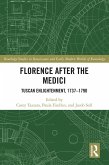Originally published in 1967. With the waning of the Middle Ages, the life of the Italian polis underwent a gradual but unmistakable transformation. The leisurely decentralization of the medieval commune, which had its roots in feudalism, the code of chivalry, and religious faith, gave place to the tight despotism of the fourteenth century. This in turn yielded to democratized government and finally to a stricter legalistic and puritanical rule. Marvin Becker's two-volume study of Florence examines this metamorphosis and establishes its relationship to the emergence of the Renaissance state. Volume One traces the decline of the communal paideia in its political, social, and cultural aspects. Through an intensive examination of the fiscal and juridical records of the period and the documents of contemporary literature, Dr. Becker demonstrates the relationship between the death of communal ideals and the centralization of political power, and between the emergence of a strong middle class and a respect for public law. He shows the patricians discovering a community of interest with the burghers, and the vendetta being replaced by courts of law. Finally, he traces the growing ability of the Florentine citizenry to cope with crisis through the newly strengthened organs of the republic. Volume Two will discuss the establishment of Florence as a Renaissance city-state with particular emphasis on the continuum between the medieval commune of the late thirteenth and early fourteenth centuries and the centralized city of the mid-fourteenth century. A unique contribution of this volume lies in the use made of painstaking and detailed investigation of the voluminous archival resources of the Archivio di Stato of Florence-some of which have since been destroyed by the 1966 flood. In pursuit of what actually took place during communal council meetings, what legislation was passed and what rejected, Dr. Becker scrutinized tens of thousands of documents in a variety of categories, obtaining first-hand knowledge of the careers of those in power, and gaining illuminating insights into motivations and actions. Political, social, and cultural historians will find Florence in Transition, Volume One, a helpful elucidation of the dynamics of historical change and the birth of a state.
Dieser Download kann aus rechtlichen Gründen nur mit Rechnungsadresse in A, B, BG, CY, CZ, D, DK, EW, E, FIN, F, GR, HR, H, IRL, I, LT, L, LR, M, NL, PL, P, R, S, SLO, SK ausgeliefert werden.









